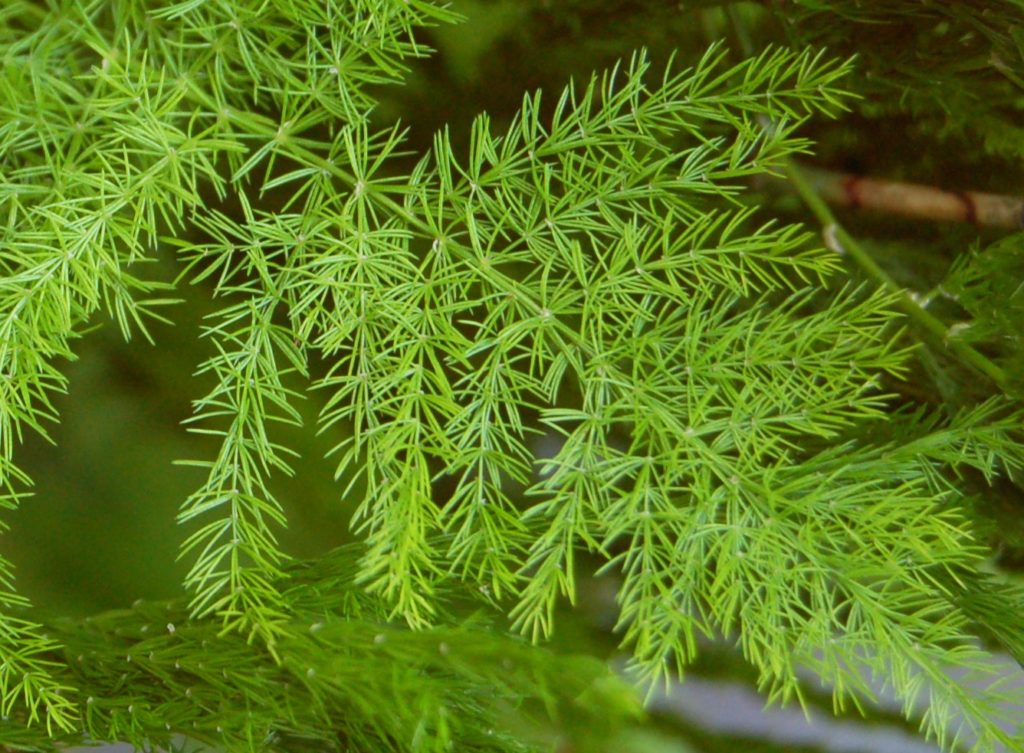
Shatavari – Ein Geschenk an die Frauen
Shatavari, also known as Asparagus racemosus or as Indian Asparagus is one of the main rejuvenator in Ayurveda, the ancient healing art of the world. It grows like a vine and forms white, radish shaped tubers. Its branches have a spring-like structure and the leaves resemble soft needles. The stem is woody and dark green, the flowers are small, white and fragrant. It bears berries which become purple when ripe. Shatavari grows in the lower forest layer in the tropics. In the wonderful, tropical state of Kerala in India, they are in abundance. The there practicing Ayurvedic physicians have used their roots and leaves for medicinal purposes already thousands of years ago and for good reason. After Ayurveda principle there are three main energy in the body of every human being. They are called doshas and hot Vata, Pitta and Kapha. The ratio of the three doshas one another is different in each body. In a healthy body all three doshas are in balance. It has been shown that Shatavari effectively helps to regulate pitta dosha once it is out of balance.
health benefits
Shatavari is a gift to the woman in fact. It purifies the blood and the female reproductive system and enhances fertility. In addition, it maintains the uterus and the egg and help the female organs for pregnancy prepare and prevent possible miscarriages. Shatavari also contains phytoestrogens, which have structural similarity to estrogen. Phytoestrogens help women who suffer from low natural estrogen production, as a result of menopause, hysterectomy or ovariectomy. Shatavari also regulates the menstrual cycle and ovulation. Also menstrual pain, bloating and irritability are reduced. In addition, the plant has a high content of folic acid and helps to avoid anemia.
Shatavari literally means “100 lovers”. According to Ayurveda, Shatavari strengthens the woman’s body to such an extent that it is able to produce thousands of healthy eggs. Dry membranes, and the vaginal wall to be balanced with the help of the medicinal herb. Shatavari also alleviates morning sickness during pregnancy and effectively helps in cleaning the uterus after childbirth. Ayurvedic texts indicate that the plant will also affect the health of the mother is positive and the proper intake improves milk production. Premenopausal women can take the herb to cool her body during hot flashes and sweats. Also, women in post-menopause and those who have a hysterectomy behind may benefit from the rich phytoestrogens of Shatavari. With the help of the plant, the dry tissue of the reproductive organs are as we age kept moist. Men also benefit from Shatavari, especially in the treatment of impotence and general sexual weakness, because it acts as an aphrodisiac and enhances libido.
Shatavari is also very effective against stomach ulcers, hyperacidity and diarrhea. Dry and irritated mucous membranes in the upper respiratory tract are soothed by the herb and make it as well as a remedy for bronchitis and chronic fever. Moreover Shatavari is an adaptogenic plant that minimizes negative effects of stress in the nervous system. Who is much under pressure can help the body and mind with taking to cope with the daily challenges.
Application of ShatavariAus of dried and ground root is a juice prepared to stomach ulcers and gastroparesis, a condition in which the stomach takes too long to empty to heal. Gastroparesis can cause heartburn, abdominal pain, vomiting and diarrhea. Medical oil is used for massage and the famous Naryana oil is extracted from the Shatavari. It strengthens muscles, reduces pain in lumbago, when Ishiassyndrom in inflamed joints and is effective in paralysis and paresis. From the leaves of the plant, a paste is produced which reduces the burning sensation in chickenpox. Depending on condition and the patient’s condition, the herb can pur, cooked in milk, are included as medicated oil or food or processed as a paste and applied externally. Shatavari nourishes the body and the soul, built on a strong immune system and promotes long life. The application can slow the aging process of cells, tissue and organs. The plant is a good source of zinc, calcium, and B vitamins. Your estrogens have no negative side effects. The mild herb can help to lead a more balanced life, which is why it is often called the “queen of herbs”.
